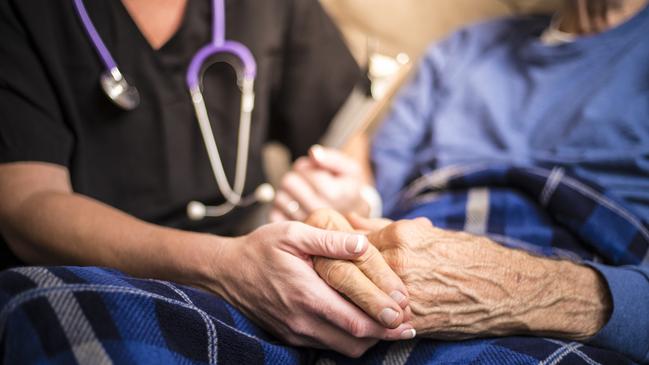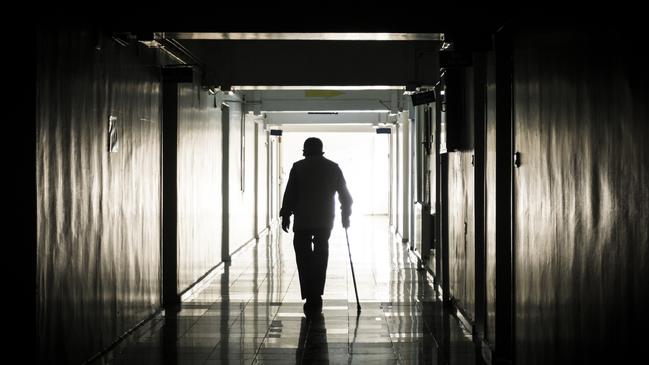We despaired for Dad, then found networks of aged-care desperation
The night before my father was moved from hospital to a nursing home I prayed he would die before the morning.

The night before my father was moved from hospital to a nursing home I prayed he would die before the morning.
It wasn’t just the horror stories of brutal care workers that haunted me and my siblings; it was the sense of guilt, of terrible betrayal at doing to Dad what we had always promised both parents we’d never do. We were terrified of leaving Dad at the mercy of a cruel nurse but we also didn’t want him to think we were abandoning him, to realise he’d never see home again.
It’s a decision, heartbreaking and cruel, that an increasing number of us will have to make as the population ages; a decision to be made not just for our parents or grandparents but eventually, perhaps, for ourselves.
And for many, as it was for us, that decision will be made for them, with no time to hunt around for a home they know will give their parents the highest standard of care.
For the past eight years, since Dad’s health — both physical and mental — first began to plummet we had done everything to keep him at home; first in his own place, with my sisters and I making sure one of us was with him every night; then for the last two years in our homes.
But last November Dad suffered a massive stroke, which he wasn’t expected to survive. Defying all odds, he did live and even began to recover until complications sent him back downhill, deteriorating so much that eventually we were told to expect the worst. But when he rallied, slightly, his doctor announced that as he no longer qualified for palliative care, and wasn’t “co-operating” with the rehab physiotherapist, he would be discharged. We were given a week to find a nursing home or take him home — an option even the doctor conceded was too dangerous as he needed two carers around the clock, which we couldn’t provide.
This was 10 days before Christmas, when nursing homes fill quickly as hospitals empty their beds before they’re reduced to skeleton staff and families caring for parents at home give themselves holiday respite.
Panicked, I called a friend who had gone through a similar crisis a year earlier. (You realise very early on in the care system that you’ll get more help from friends with similar experiences than through any official route.)
“Don’t be bullied,” she advised. “If you can’t find somewhere, tell them it’s too dangerous to take him home.”
It was invaluable advice, which I’ve had cause to repeat to the growing community of friends I’ve met in a similar situation, once to a woman who was called at work on a Friday afternoon by her mother’s hospital and given just the weekend to find a nursing home.

This rush is often a family’s introduction to the care system where expediency and cost seem to outweigh the welfare of a patient. With only days to find a home, most of us are forced to opt not for the best option but for the first that has a bed available.
Any aged-care royal commission should place its focus not just on nursing homes but on the often abysmal aged care within hospitals, and on this transition from hospital to nursing home, when families need more help than being handed a list of homes with places available.
Dad’s move to a nursing home was made harder by the Kafkaesque nightmare into which we descended — along with, we found out, many others — trying to persuade Centrelink that, without his own home or income apart from a pension, he qualified for “concession care”, when the government pays 50 per cent of the daily care fee and the pension pays the rest.
At least the nursing home itself assuaged our fears for Dad’s care. In fact, ironically, his care in hospital was far more wanting than in the home we picked, in our rush, because it was bright and clean and because the staff seemed kind. In hospital he had become severely malnourished and developed, unnoticed, a bowel infection and bad bed sores but, once he was settled in a room of his own overlooking a little courtyard, the staff gently got him eating again, tended to his sores and cleared up the infection. He put weight back on and even seemed happy, although he asked constantly when he was coming home. Yet even in this home, which unfailingly gets the highest mark of 44 in the annual Australian Aged Care Quality Agency re-accreditation audit, mistakes can be made.
The home boasts one of the best staff-patient ratios and that it places its highest need patients near the nurses’ station to keep a constant eye on them. But before he became one of these high-concern patients, when Dad used to spend the day in a sunny room at the far end of the home, we sometimes arrived to find him soaked in urine, unnoticed, after he had pulled his catheter loose. The nurses would come at once when we told them and I can see how such incidents happen; when there are few staff on and there’s an emergency somewhere, as there often is, sometimes residents get overlooked.
But if these mistakes can happen in a facility that is excellent by any standards, how much worse is it in lesser homes, where residents are likelier to be neglected? Or even in homes where the carers are well meaning but there are too few of them to care properly for their patients?
Even though their rates of pay are abysmal, funding cuts mean many homes can’t — or won’t — pay for extra staff.
My sisters, husband and I make sure one of us is at Dad’s home every day so we see, more than most, the strain of the workload borne by the staff — and their patience with difficult, sometimes aggressive, residents. We’ve found care workers giving Dad a little hug as they dress or change him, telling him how handsome he is; and we’ve seen them stroking the hand of distressed residents, talking gently as they feed them.
But staff tell me of the abuses they’ve seen in other homes they’ve worked in; one of the cooks said she lost her part-time job in another home after reporting a nurse for shoving a patient into a wall. No action was taken against the nurse.
And in conversation with friends in similar situations it has become clear that, even when there is no abuse, some facilities don’t have enough medically trained staff to care properly for their residents. Some have only one or two registered nurses to care for dozens of patients, while others find it difficult to get GPs to attend regularly.
Certainly any medical attention apart from a GP visit has to be arranged by a resident’s family, which isn’t always easy. Even in the best homes, finding a doctor or trained medical staff at short notice is often difficult. One friend couldn’t find a registered nurse when her mother had a severe stroke and, when one eventually came, she didn’t recognise the symptoms of stroke, insisting: “That’s how she always is.”
Dad fell suddenly ill with aspiration pneumonia during a public holiday weekend when his GP was away. The nurses couldn’t find a locum to treat him. With his condition worsening dramatically, a nurse called an ambulance, but the paramedics noted on Dad’s records the Do-Not-Resuscitate form we’d been talked into signing after his stroke and refused to take him. It was only because my sister was at the home and could rescind the DNR that they eventually agreed. If she hadn’t been there, there’s a good chance he would have died that night.
At hospital, a doctor advised again that we sign the DNR and questioned whether we wanted him treated at all, even with antibiotics; after all, he said, Dad would never recover fully and the pneumonia would inevitably return. The underlying message was: what’s the point?
It was a cruel reminder that once your parents are in this system, they are edged, quietly but inexorably, towards death. As one woman in Dad’s home told me, heartbreakingly: “For us, there’s no light at the end of this tunnel.”
It’s the saddest of journeys and one we all deserve to be helped on with the greatest compassion. Yet for most of us every step is a struggle. My family and I consider ourselves lucky with Dad’s nursing home, but if we’re finding the experience difficult and at times unbearably painful, how much worse is it for those who can’t depend on the care to which they’re entitled? This is something we can’t ignore any more. With an ageing population the number of people in care is only going to increase and, unless something changes, the quality of that care will become only more precarious. It affects us all, not only your parents and grandparents but, eventually, you too.
Anne Barrowclough is a senior digital producer at The Weekend Australian.


